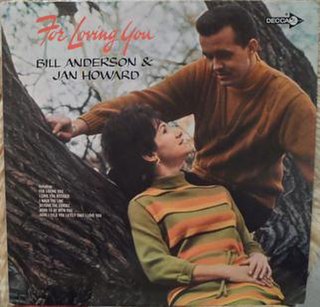
For Loving You is a studio album released by the American country music artists Bill Anderson and Jan Howard in February 1968 on Decca Records. The album was their first collaborative album, setting the trend for a series of studio albums over the next few years. The album's title track, "For Loving You", was the lead single and became a number 1 hit on the Billboard country songs chart.
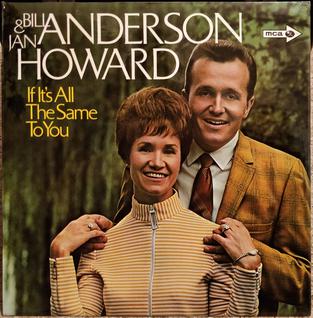
If It's All the Same to You is a studio album by American country music artists Bill Anderson and Jan Howard. The album was released on Decca Records in March 1970 and was produced by Owen Bradley. It was the pair's second collaborative album after several years of performing together on tour and on television. The album's title track became a major hit on the Billboard country chart, reaching the top 10. Additionally, the album itself would reach peak positions on the Billboard country albums chart.

Rock Me Back to Little Rock is the tenth studio album by American country artist Jan Howard. It was released in June 1970 on Decca Records and was produced by Owen Bradley. The album featured two singles, one of which became a top 20 hit on the Billboard country chart. Additionally, the album would reach peak positions on the Billboard country albums chart.

Bill and Jan (Or Jan and Bill) is a studio album released by American country artists Bill Anderson and Jan Howard. It was released in January 1972 on Decca Records and was produced by Owen Bradley. It was the duo's third collaborative album together and featured singles that became hits on the Billboard country chart. The album itself would also chart on the Billboard country albums list in 1972.
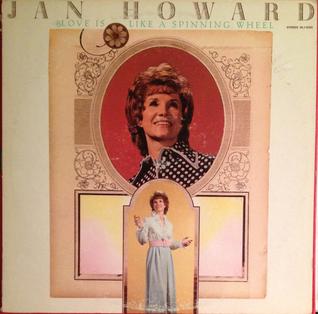
Love Is Like a Spinning Wheel is the twelfth studio album by American country artist Jan Howard. It was released in March 1972 on Decca Records and was produced by Owen Bradley. The album spawned two singles that became minor hits on the Billboard country songs chart. It was one of Howard's final studio albums for the Decca label before departing the label within a year's time.
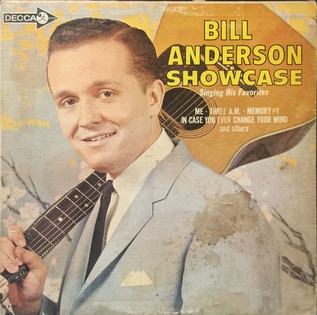
Showcase is a studio album by American country singer-songwriter Bill Anderson. It was released in November 1964 on Decca Records and was produced by Owen Bradley. The album was Anderson's third studio release as a recording artist and second to be released in 1964. It included two singles that became major hits on the Billboard country chart along with subsequent B-sides.

Bright Lights and Country Music is a studio album by Bill Anderson and the Po' Boys. It was released in November 1965 on Decca Records and was produced by Owen Bradley. It was Anderson's first studio album to include dual credit with his band, The Po' Boys. It was his fourth studio album overall. The album included one single release, the title track. This song became a major hit on the Billboard country charts. The album itself also reached charting positions on Billboard shortly after its release.

I Love You Drops is a studio album by American country singer-songwriter Bill Anderson. It was released in August 1966 on Decca Records and was produced by Owen Bradley. It was Anderson's fifth studio release and included three singles that became major hits on the Billboard country chart. The album would also become a success on the Billboard country albums list upon its release, becoming one of his most successful charting albums.

Get While the Gettin's Good is a studio album by American country singer-songwriter Bill Anderson. It was released in February 1967 on Decca Records and was produced by Owen Bradley. The project was Anderson's sixth studio album and included one single issued. The album itself reached peak positions on the Billboard country albums chart.

I Can Do Nothing Alone is a studio album by American country singer-songwriter Bill Anderson. It was released in June 1967 on Decca Records and was produced by Owen Bradley. It was Anderson's seventh studio record and his first album to consist entirely of gospel music. Although the album did not produce any singles, it made peak positions on the Billboard country albums chart.
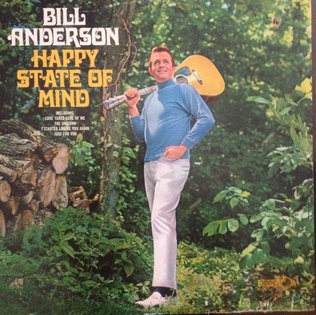
Happy State of Mind is a studio album by American country singer-songwriter Bill Anderson. It was released in September 1968 on Decca Records and was produced by Owen Bradley. Anderson's tenth studio recording, it was also his second studio album released in 1968. Among the songs included on the release was the title track, which became a major hit in both the United States and Canada.

My Life/But You Know I Love You is a studio album by American country singer-songwriter Bill Anderson. It was released in June 1969 on Decca Records and was produced by Owen Bradley. It was Anderson's eleventh studio album to be issued during his musical career. The album's title was derived from its two singles of the same names. Both singles became major hits on the Billboard country chart.
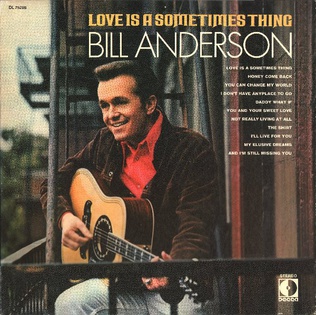
Love Is a Sometimes Thing is a studio album by American country singer-songwriter Bill Anderson. It was released in June 1970 on Decca Records and was produced by Owen Bradley. It was Anderson's fourteenth studio album since signing with the Decca label in 1958. Its only single, the title track, would become a major hit on the Billboard country chart in 1970. The album itself would also reach peak positions on the country albums chart following its release.

Where Have All Our Heroes Gone is a studio album by American country singer-songwriter Bill Anderson. It was released in December 1970 on Decca Records and was produced by Owen Bradley. It was Anderson's fifteenth studio album as a recording artist and his third studio album released in 1970. The album's title track became a major hit on the Billboard country chart. The album itself would also reach peak positions on the Billboard country albums chart.

Bill Anderson Sings for "All the Lonely Women in the World" is a studio album by American country singer-songwriter Bill Anderson. It was released in May 1972 on Decca Records and was produced by Owen Bradley. It was Anderson's nineteenth studio recording to be released during his music career. The album included one song that became a major hit for him in 1972, the title track. The album would also reach positions on national music charts at the time.
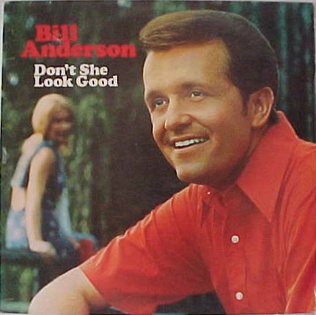
Don't She Look Good is a studio album by American country singer-songwriter Bill Anderson. It was released in November 1972 on Decca Records and was produced by Owen Bradley. The album was Anderson's twentieth studio recording to be issued. It was also his fourth studio album released in 1972. Two additional projects were collaborations with Jan Howard earlier in the year. The album's only single was the title track, which became a major hit on the country charts.
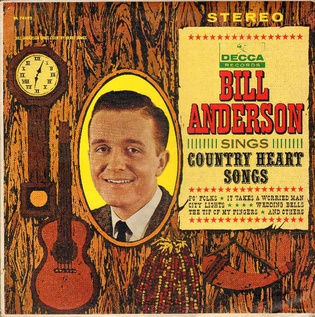
Bill Anderson Sings Country Heart Songs is a compilation album by American country singer-songwriter Bill Anderson. It was released in January 1962 on Decca Records and was produced by Owen Bradley. Despite it being a compilation, the project was Anderson's debut album release as a recording artist. It featured several of his early hits with the Decca label and included one song that would later be issued as a single in 1962.

Bill Anderson's Greatest Hits is a compilation album by American country singer-songwriter Bill Anderson. It was released in October 1967 via Decca Records and was produced by Owen Bradley. The album was Anderson's third compilation recording released in his career and first album of greatest hits. Twelve tracks were included on the collection that had been previously released. The album itself also reached major record chart positions.
"Get While the Gettin's Good" is a song written by Ted Cooper and Steve Karliski. It was first recorded by American country singer-songwriter Bill Anderson. It was released as a single in 1967 via Decca Records and became a major hit.
"All the Lonely Women in the World" is a song written and recorded by American country singer-songwriter Bill Anderson. It was released as a single in 1972 via Decca Records and became a major hit the same year.


















